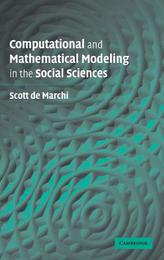
|
Computational and Mathematical Modeling in the Social Sciences
Hardback
Main Details
| Title |
Computational and Mathematical Modeling in the Social Sciences
|
| Authors and Contributors |
By (author) Scott de Marchi
|
| Physical Properties |
| Format:Hardback | | Pages:220 | | Dimensions(mm): Height 236,Width 157 |
|
| ISBN/Barcode |
9780521853620
|
| Classifications | Dewey:300.151 |
|---|
| Audience | | Professional & Vocational | |
|---|
| Illustrations |
7 Tables, unspecified; 20 Line drawings, unspecified
|
|
Publishing Details |
| Publisher |
Cambridge University Press
|
| Imprint |
Cambridge University Press
|
| Publication Date |
15 August 2005 |
| Publication Country |
United Kingdom
|
Description
Mathematical models in the social sciences have become increasingly sophisticated and widespread in the last decade. This period has also seen many critiques, most lamenting the sacrifices incurred in pursuit of mathematical rigor. If, as critics argue, our ability to understand the world has not improved during the mathematization of the social sciences, we might want to adopt a different paradigm. This book examines the three main fields of mathematical modeling - game theory, statistics, and computational methods - and proposes a new framework for modeling. Unlike previous treatments which view each field separately, the treatment provides a framework that spans and incorporates the different methodological approaches. The goal is to arrive at a new vision of modeling that allows researchers to solve more complex problems in the social sciences. Additionally, a special emphasis is placed upon the role of computational modeling in the social sciences.
Author Biography
Scott de Marchi is Assistant Professor of Political Science at Duke University. His work has been funded by the National Science Foundation, and he has published articles in the American Political Science Review, Journal of Politics, Journal of Theoretical Politics and Public Choice. Professor de Marchi was appointed a Fellow-at-Large by the Santa Fe Institute in 1999, and is a faculty member of the Ralph Bunche Summer Institute and the Empirical Implications of Theoretical Models program. His research continues to focus on the field of computational political economy and other mathematical methods, individual decision-making, the presidency, and public policy.
Reviews' ... we have in this slim volume, full of good ideas, deep insights and practical advice for how to do sound methodological work and how not to do it. Given these strengths, this book should earn a cultish following among graduate students who possess a methodological bent.' Public Choice
|